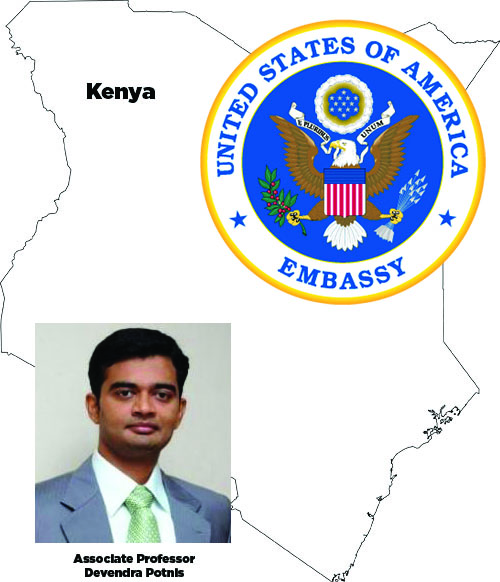Where Digital Literacy, Social Media, and Fighting Corruption Converge
 Social media is a tool for people across the world to utilize in versatile ways – and in some cases, it can change countries. One aspect of this phenomenon was recently studied by School of Information Sciences Associate Professor Devendra Potnis and two SIS students, Hilary Jasmin and Lindsey McLennan. They undertook the research for the United States Embassy Nairobi Economic Affairs Section, and focused on ways that people in countries with corrupt governments could use social media as a means for lasting, positive change.
Social media is a tool for people across the world to utilize in versatile ways – and in some cases, it can change countries. One aspect of this phenomenon was recently studied by School of Information Sciences Associate Professor Devendra Potnis and two SIS students, Hilary Jasmin and Lindsey McLennan. They undertook the research for the United States Embassy Nairobi Economic Affairs Section, and focused on ways that people in countries with corrupt governments could use social media as a means for lasting, positive change.
Potnis said they researched the correlation between digital literacy and a government’s ability to manage good governance. They took an insightful look into how digital literacy makes it easier for government to implement good governance measures, but also observed whether a digitally literate populations put governments into a place of increased accountability. The project’s aim was to help United States diplomats to address real-world challenges in developing countries, and to illustrate the value of information literacy and digital literacy for addressing research questions and real-world problems at the intersection of public administration, e-Governance, communication, and information science. Potnis said it was also intended to inspire the students who worked on the project to serve their country through research, and to train them in research methods. In both, he said the project was successful.
“Hilary Jasmin, one of the MSIS students on this project, is so much inspired by this whole experience, including interacting with the officers from the US Embassy Nairobi Economics Section that she has now decided to join the public service. She is preparing for the relevant exams,” he said.
Potnis and the students researched these points:
- Types of corruption in various levels of governments, and ways to detect and prevent it.
- Ways in which corruption creates barriers to good governance and its adverse effects on citizens.
- Role of electronic governance in creating transparency and accountability to alleviate corruption.
- Dimensions and degrees of digital literacy of citizens measured broadly in terms of their ability to access and use information and communication technologies and digital information.
- The role of digital literacy of citizens in shaping the mode and degree of their electronic-participation in creating good governance.
- Factors influencing willingness and capability of citizens to apply digital literacy for preventing corruption.
As a result of this research, the US Embassy plans to use the team’s guidelines for using social media for training citizen journalists to fight corruption in developing countries, and they are interested in several of Potnis’ research papers and ongoing projects related to e-Governance and social media.